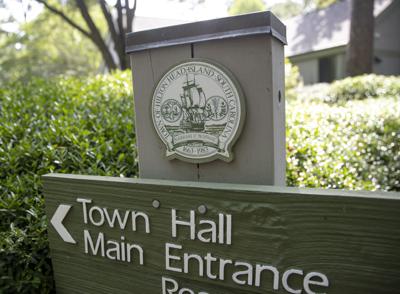HILTON HEAD ISLAND — One family story has always weighed on Angie Stone. It's about her cousin, who is both deaf and mute. The cousin was traveling on a bus between Columbia and Charleston. The bus paused at a rest stop and everyone got off. When the bus rolled away, Stone's cousin was left behind.
"Imagine the horror for her, of trying to communicate with somebody, right?" Stone said.
The anguish of her cousin's plight feels far from the calm orderly offices of Hilton Head Island's Town Hall, where Stone is the assistant town manager. But it informs her effort to provide interpretation services to residents and visitors who can't understand or express themselves to town staff.
In June, the town of Hilton Head Island launched a 24/7 service that can interpret for anyone who needs it, including people with no or limited English and those who are deaf or hard of hearing.
Stone expects residents and visitors to use it to get information, apply for licenses or permits and interact with the Fire Department or other first responders.
"Folks who come here to work, folks who live here, need to be able to understand what's happening in their town," Stone said.
Not artificial intelligence
A number of artificial intelligence services offer language interpretation. But the town ultimately decided to use a service that connects users with real people. Town staff can access the service, called LanguageLine, on an app.
The app first identifies what language someone is speaking. Then it provides a live interpreter who can interact with everyone in the conversation.
The personal nature of the exchange hopefully builds trust and provides nuance.
Best of all, said Stone, the expense is minimal.
The town pays only for the time it uses. When Stone tested the app with a Spanish-speaking friend, 10 minutes of interpretation cost $4.58.
"If we're able to help folks understand and get the services that they need, then we've done something great," she said.
Shifting demographics
The U.S. Census Bureau estimates that in 2021 about 13 percent of residents on Hilton Head spoke a language other than English at home.
Many of these residents speak Spanish; about 4,950 people out of the island's 38,000 residents identify as Hispanic.
Other languages that are common in the U.S. are Chinese, Tagalog, Vietnamese, Arabic, French and Korean. In the country as a whole, about 38 percent of people who speak a foreign language at home say they don't speak English very well.
Stone isn't sure how people on Hilton Head with limited English have been getting information so far. Perhaps from their children; perhaps simply by showing up at an office and muddling through.
Her fear is that they haven't been getting it at all.
To distribute information to Hispanic residents in particular, the town has created a website in Spanish — not using Google Translate, Stone said, but with the help of a real person who could provide context.
While the Spanish site helps, the benefit of the interpreting app is its flexibility for the unexpected situation, especially with a visitor.
"They get hurt sometimes, they have accidents," Stone said.
The Chamber of Commerce finds that about half the island's international visitors are from Canada. European visitors comprise about 17 percent, with the bulk of people coming from the United Kingdom and Germany.
A smaller proportion of visitors comes from Asia, Africa and the Middle East.
Few multilingual Americans
Although she's proud of the town's efforts to communicate with everyone who comes to the island, Stone also laments the need for a technical intermediary at all. She noted that no one on the town staff speaks a language other than English fluently.
Nor do 80 percent of Americans. Of those who do, the majority pick it up at home. Only about 25 percent of multilingual Americans learn another language at school or elsewhere.
Stone herself makes an effort with Spanish, but she doesn't have a lot of confidence in her skills. Recently she wanted to express her affirmation. Instead, she announced that she is a horse.










